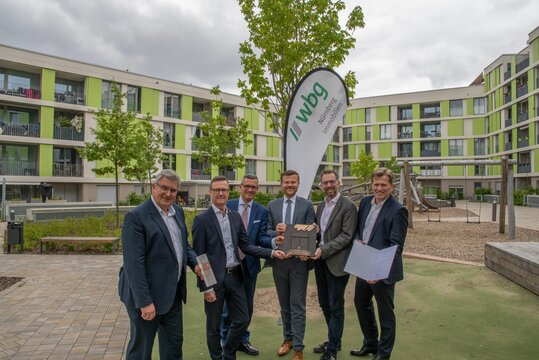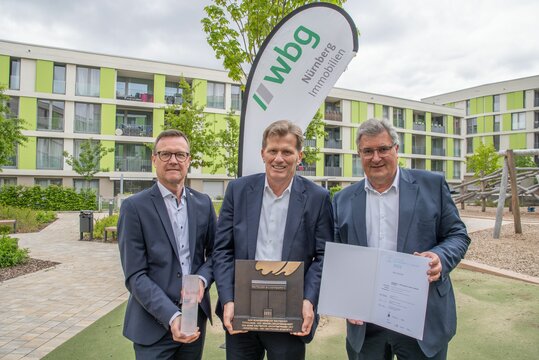The housing market in Nuremberg remains under significant pressure. The population of the city of Nuremberg increased by around 14,000 in 2022, primarily due to the influx of refugees from Ukraine. All of them need housing, which has further worsened the housing market situation.
The effects of the pandemic were still being felt in 2022: construction prices remained high and increased further, and there were still supply bottlenecks to manage. This is still the case today. The situation has been compounded by the impacts of Russia's attack on Ukraine. Political sanctions against Russia are still causing uncertainty, as well as concerns about oil and gas shortages and significant increases in energy prices and inflation. These issues are posing financial burdens that restrict peoples’ lives. Inflation has increased significantly.
Shortages of resources in different areas of construction, and increases in interest rates, are making building more expensive than ever before. A high level of commitment is required here from everyone involved, as well as, in particular, reliable political decisions in order to contain the negative impacts.
“We had to review all planned projects based on current framework conditions, and in consideration of ensuring the company's ongoing and stable economic performance capabilities, both for existing buildings and among property developers. We have also looked for ways to optimise the costs of maintenance measures in order to generate added savings”, explain wbg Managing Directors Ralf Schekira and Frank Thyroff during a press briefing.
As a result, wbg’s investments have had to be reduced by around a third. This applies to both new buildings and the modernisation programme.
From the perspective of the sector, and wbg Nuremberg as well, it is policy makers who have to step up to the plate. Reliable criteria are needed for the required residential construction, alongside feasible and reasonable regulations to achieve targets for modernizing air conditioning and heating systems.
Building must become affordable once again!
Currently, the primary issues facing the construction industry are the building crisis, and renovating existing buildings to protect the climate in consideration of social issues. “Building must become affordable once again” emphasises Hans Maier, Director of the Verband bayerischer Wohnungsunternehmen (Association of Bavarian Housing Enterprises). After all, over time residential construction in the Free State has not been able to keep up with significant population growth. “Our members are doing their part to chip away at the housing shortage”, says the Director. However, their investments also need to pay off. Specifically, this means that construction costs finally need to come down. To build the housing needed, reliable and adequate funding is needed, without overbearing bureaucracy.
The housing industry bears great responsibility in the area of climate change. The goal is to make existing buildings climate-neutral, while keeping rents affordable. “However, this is a difficult balancing act”, says the Director. Under current funding conditions, climate neutrality measures are not cost-neutral for renters. “If we are honest, climate protection investments can only be financed through rent increases or funding”, Maier explains. For many renters, the expenses that would result from implementing the required measures would not be affordable. Because of this, social cushioning is needed.
Deutscher Bauherrenpreis (German Building Developer Prize)
Under the conditions that have reigned in recent years, winning the Deutscher Bauherrenpreis for the EUROPAN12 project is a special honour. It is considered the most important prize for residential construction in Germany. It has been awarded since 1986 under the traditional motto of “High quality – affordable cost”. Prizes are awarded for forward-looking and innovative examples that meet the diverse challenges of our time and offer transferable solutions.
The jury for the Deutscher Bauherrenpreis received applications from 187 projects across Germany. These include new buildings, modernisations and conversions. 29 projects from this group were nominated for the coveted prize.
Nine projects from throughout Germany received the award, with two of them receiving a special prize.
The jury praised the EUROPAN12 project by wbg Nuremberg because the small-scale urban development of the 1920s in Nuremberg’s Südstadt was further developed to form a liveable district with urban density, making it exemplary for the upcoming challenges of urban redevelopment.
The constructions of the new replacement buildings saw the creation of 132 rental flats, 49 of which were subsidised under the EOF (income-based rental assistance), as well as an after-school care centre with 25 places and four additional commercial units. For this purpose, wbg Nuremberg invested around €28.2 million.
wbg's Chair of the Supervisory Board, Nuremberg's Mayor Marcus König, is excited about the award: “wbg is essential for creating new housing in Nuremberg. The fact that we have been awarded the Deutscher Bauherrenpreis proves that wbg is building smart, creating new housing, and playing an important role in urban development. I want to thank everyone who works at wbg every day to develop and maintain good housing”.
“We are very pleased about this award, because it is an important recognition of the further development of Südstadt and shows that the wbg team is pursuing the further development of its districts with great expertise and is working creatively on solutions to meet the challenges of the housing market in Nuremberg”, states wbg Managing Director Ralf Schekira on the occasion of the award ceremony.



